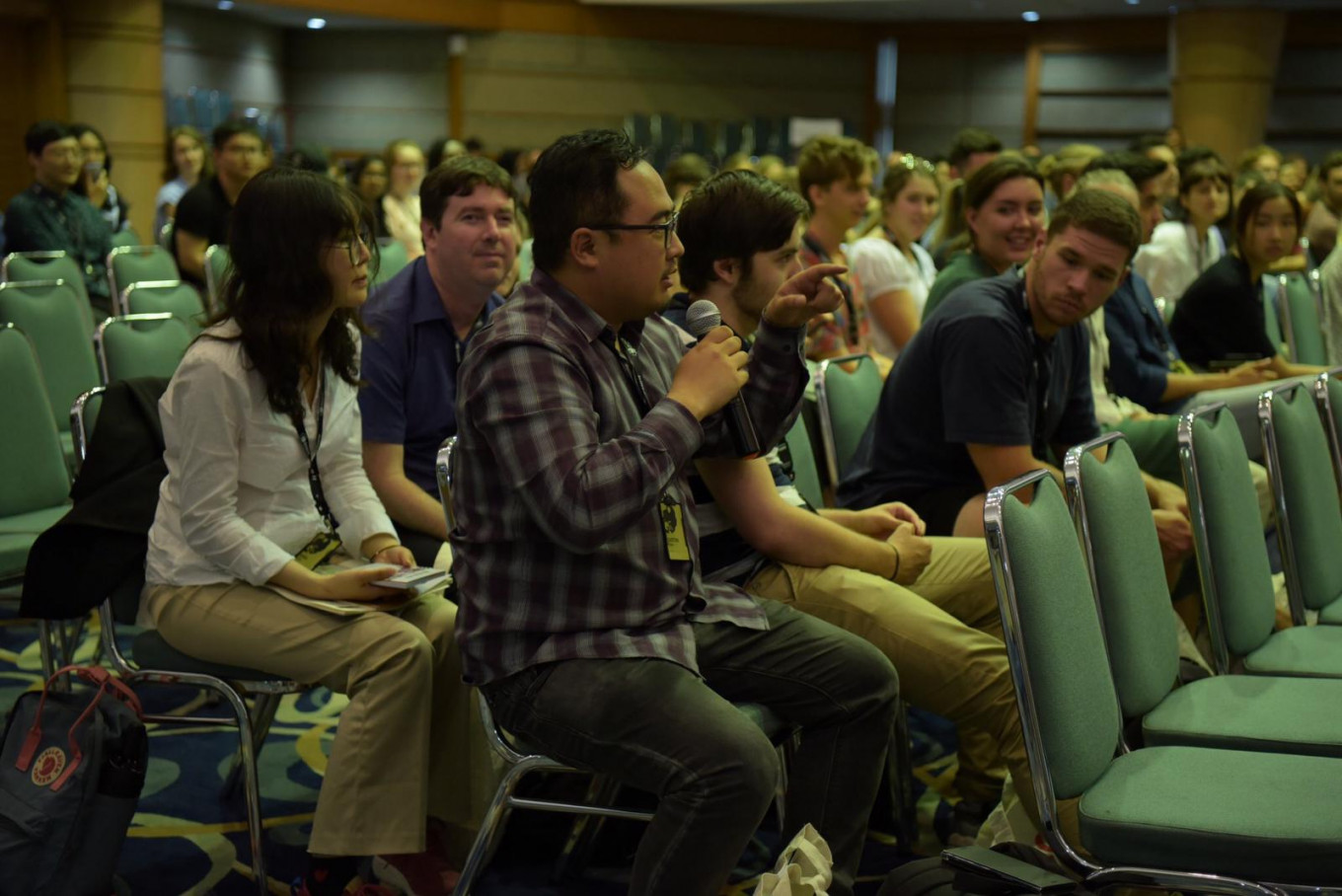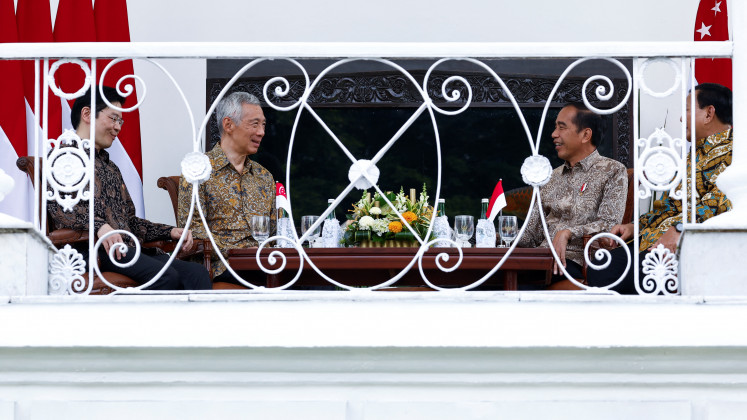Neighbors or strangers? Live-in experiences aim to improve RI-Aussie ties
Australians have long lost interest in the Indonesian language, but a renewed push to familiarize young Aussies with their closest Asian neighbors seeks to reverse the waning interest in Indonesia.
Change Size
 Australian journalism student Justin Tatel (center) speaks during the opening ceremony of the Australian Consortium for In-Country Indonesian Studies (ACICIS) Jakarta Professional Practica 2019 at Atma Jaya University in Jakarta, on Jan. 3 2019. Currently there are 144 Australian students taking part in the ACICIS program. (Courtesy of/ACICIS)
Australian journalism student Justin Tatel (center) speaks during the opening ceremony of the Australian Consortium for In-Country Indonesian Studies (ACICIS) Jakarta Professional Practica 2019 at Atma Jaya University in Jakarta, on Jan. 3 2019. Currently there are 144 Australian students taking part in the ACICIS program. (Courtesy of/ACICIS)
B
udding journalist Alex Dalziel said he had learned more Indonesian after five weeks of study in Jakarta than after two years of taking the language in high school back in Australia.
“Along with most of my classmates, I dropped Indonesian, because I wasn’t interested. A lot of people that kept studying weren’t really interested in the language either – it was just an easy subject,” said the 20-year-old student from RMIT University.
His is an opinion that many young Australians have shared over the past few decades, not least since the early 1970s, when interest in the Indonesian language peaked and since continued to decline.
Experts have pointed to Australians’ indifference to Indonesia and its rich cultural diversity, which had prevailed mainly due to a lack of understanding.
Former Indonesian president Susilo Bambang Yudhoyono was aware of the disconnect when he told the Australian parliament in 2010 that the archipelagic country was “infinitely more than a beach playground with coconut trees”.
His comment was a nod to the running joke that Bali is Australia’s “seventh state”, as most Aussie tourists are only interested in beaches and Bintang beer.
Almost a third of Australians surveyed in a 2013 poll even thought Bali was a country of its own.
Pundits generally believe they do not care about Balinese culture, much less Indonesian culture – if they even know the difference.
David Hill, a linguist and Asia scholar from Murdoch University, pinned it down to a lack of Indonesian language classes at Australian schools and universities, which reflected “Australians’ interest in, knowledge of and engagement with Indonesia”.
He found that although Indonesian is the third-most studied language at Australian schools, less than 1 percent of graduates have some proficiency.
At the tertiary level, Hill’s research showed that only 15 Australian universities offered standalone Indonesian studies, and seven had cancelled their programs in the 14 years prior to his 2012 report.
Elena Williams, board member at the government-backed Australia-Indonesia Institute, said although there were many reasons for Australia’s dwindling Indonesian language education, much of the issue lay with misrepresentation in Australian media.
She said negative stories of boats, beef and bombings often dominated media coverage, portraying Indonesia as a “hard sell”.
“I get it’s the bad news that sells, but if they’re the only perceptions Australians and Indonesians have of each other, what are we learning?” asked Williams.
She said these misconceptions created a fear of Indonesia and led parents to discourage their children from studying the language.
“One of the biggest obstacles universities and schools face in keeping Indonesian and other Asian languages on the curriculum is resistance from parents,” she said. “This has a pivotal impact when parents are helping their children choose future directions and career paths.”
Williams also believes there are very few teachers with the knowledge to teach Indonesian effectively, which further reduces students’ interest.
However, there have been some positive developments in Australia’s higher education system.
In 2014, the Australian government launched the New Colombo Plan (NCP), an initiative that financially supports Australian university students to undertake study and internships in Asia, offering young students like Dalziel the opportunity to learn about Australia’s northern neighbors.
To date, the NCP Mobility Program has seen more Australian students undertake short-term studies and internships in Indonesia than in any other country.
Over the past five years alone, the Australian government has sent nearly 7,000 students to live and study in Indonesia, roughly a five-fold increase from 2014 figures, according to data from the Australian Embassy in Jakarta.
The Australian Consortium for ‘In-Country’ Indonesian Studies (ACICIS) is one of many organizations that offer study programs to NCP recipients.
Currently, 144 ACICIS students are undertaking Indonesian language studies in Jakarta as well as internships in their various disciplines.
Wilia Paramitasari, familiarly known as Sari, the ACICIS Jakarta program coordinator, said “these programs shape and change perspectives and opinions”.
However, she said she wanted to see a similar initiative in Australia for Indonesian students, to balance the exchange.
“The mutual advantages [of exchange programs] to each country will be more and more tangible in the coming years,” Sari told The Jakarta Post recently.
For many, language could go a long way in deconstructing stereotypes and facilitating a more nuanced understanding between Australians and Indonesians.
Something could be learned from the popular Indonesian saying, ”tak kenal maka tak sayang" (you can’t love someone you don’t know).
— The writer is an intern at The Jakarta Post under the ACICIS program.









